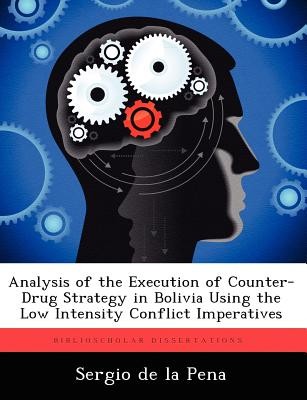
- We will send in 10–14 business days.
- Author: Sergio de la Pena
- Publisher: BiblioScholar
- ISBN-10: 1249363101
- ISBN-13: 9781249363101
- Format: 18.9 x 24.6 x 0.7 cm, softcover
- Language: English
- SAVE -10% with code: EXTRA
Analysis of the Execution of Counter-Drug Strategy in Bolivia Using the Low Intensity Conflict Imperatives (e-book) (used book) | bookbook.eu
Reviews
Description
This study investigates the actions of U.S. military personnel conducting the counter-drug mission in Bolivia in accordance with the Bolivian/U.S. Counter-Drug Strategy. The analysis determines if U.S. personnel, in executing their mission, are complying with the low intensity conflict (LIC) imperatives. These imperatives are (1) political dominance, (2) adaptability, (3) unity of effort, (4) legitimacy, and (5) perseverance. The study used Operations "Blast Furnace" and "Snowcap" conducted in 1986 and 1989 respectively as illustrative examples to analyze the execution of the counter-drug mission. The LIC imperatives are the doctrinally approved "truths" acknowledged as essential to the successful planning and execution of LIC operations which are: insurgency-counterinsurgency peacekeeping operations, combatting terrorism, and peacetime contingency operations. The counter-drug mission is a subset of peacetime contingency operations; therefore, the analysis provides a validation of the imperatives as an analytical tool. The study concluded that U.S. personnel did not comply with the LIC imperatives. The failure to comply has a direct correlation to the failure to stop the flow of cocaine from Bolivia.
EXTRA 10 % discount with code: EXTRA
The promotion ends in 17d.05:27:30
The discount code is valid when purchasing from 10 €. Discounts do not stack.
- Author: Sergio de la Pena
- Publisher: BiblioScholar
- ISBN-10: 1249363101
- ISBN-13: 9781249363101
- Format: 18.9 x 24.6 x 0.7 cm, softcover
- Language: English English
This study investigates the actions of U.S. military personnel conducting the counter-drug mission in Bolivia in accordance with the Bolivian/U.S. Counter-Drug Strategy. The analysis determines if U.S. personnel, in executing their mission, are complying with the low intensity conflict (LIC) imperatives. These imperatives are (1) political dominance, (2) adaptability, (3) unity of effort, (4) legitimacy, and (5) perseverance. The study used Operations "Blast Furnace" and "Snowcap" conducted in 1986 and 1989 respectively as illustrative examples to analyze the execution of the counter-drug mission. The LIC imperatives are the doctrinally approved "truths" acknowledged as essential to the successful planning and execution of LIC operations which are: insurgency-counterinsurgency peacekeeping operations, combatting terrorism, and peacetime contingency operations. The counter-drug mission is a subset of peacetime contingency operations; therefore, the analysis provides a validation of the imperatives as an analytical tool. The study concluded that U.S. personnel did not comply with the LIC imperatives. The failure to comply has a direct correlation to the failure to stop the flow of cocaine from Bolivia.


Reviews